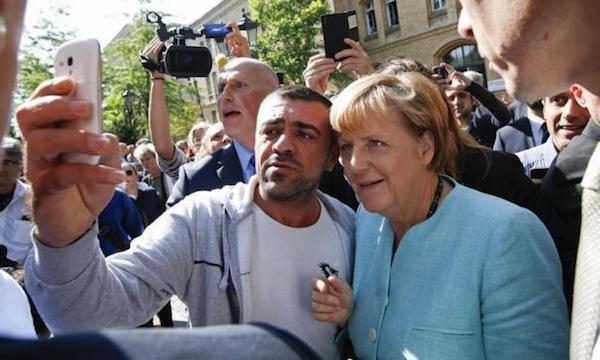

03/14/2016
Chancellor Angela Merkel’s extreme program of opening Germany (and Europe via the Schengen Agreement) to millions of hostile and/or moocher Muslims has been smacked by severe disapproval in regional elections over the weekend.Fewer selfies with invaders probably would have been a better media strategy for Merkel.

It’s reassuring that Germans have not lost their minds entirely. The initial anschluss of illegal aliens was enthusiastically promoted by the media which showed welcoming crowds of Germans, apparently happy to surrender their nation to the 1400-year enemy of the west. But pockets of resistance developed, presumably among those who had experienced Islam diversity before the Merkel invasion. Now, after the rapefugee attacks on women in Cologne and elsewhere, groups like PEGIDA (Patriotic Europeans Against the Islamisation of the West) look right all along.
In 2010, Chancellor Merkel declared multiculturalism to be a failure in Germany, but a few years later she went crazy for imposing the most extreme diversity on her people. And the citizens are showing their disapproval at the polls.Nationalists Strong, Setback for Merkel Party in German Vote, Associated Press, March 13, 2016A nationalist, anti-migration party powered into three German state legislatures in elections Sunday held amid divisions over Chancellor Angela Merkel’s liberal approach to the refugee crisis. Merkel’s conservatives lost to center-left rivals in two states they had hoped to win.
The elections in the prosperous southwestern state of Baden-Wuerttemberg, neighboring Rhineland-Palatinate and relatively poor Saxony-Anhalt in the ex-communist east were the first major political test since Germany registered nearly 1.1 million people as asylum-seekers last year.
The three-year-old Alternative for Germany, or AfD — which has campaigned against Merkel’s open-borders approach — easily entered all three legislatures.
AfD won 15.1 percent of the vote in Baden-Wuerttemberg and 12.6 percent in Rhineland-Palatinate, official results showed. It finished second in Saxony-Anhalt with some 24 percent, according to projections by ARD and ZDF television with most districts counted.
“We are seeing above all in these elections that voters are turning away in large numbers from the big established parties and voting for our party,” AfD leader Frauke Petry said.
They “expect us finally to be the opposition that there hasn’t been in the German parliament and some state parliaments,” she added.
There were uncomfortable results both for Merkel’s conservative Christian Democratic Union and their partners in the national government, the center-left Social Democrats. The traditional rivals are Germany’s two biggest parties.
“The democratic center in our country has not become stronger, but smaller, and I think we must all take that seriously,” said Vice Chancellor Sigmar Gabriel, the Social Democrats’ leader.
Merkel’s party kept its status as strongest party in Saxony-Anhalt. It had hoped to beat left-leaning Green governor Winfried Kretschmann in Baden-Wuerttemberg, a traditional stronghold that the CDU ran for decades until 2011. It also hoped to oust Social Democrat governor Malu Dreyer from the governor’s office in Rhineland-Palatinate.
However, the CDU finished several percentage points behind the popular incumbents’ parties in both states and dropped 12 percentage points to a record-low result in Baden-Wuerttemberg, with 27 percent support. Its performance in Rhineland-Palatinate, with 31.8 percent, was also a record low.
The Social Democrats suffered large losses in both Baden-Wuerttemberg and Saxony-Anhalt, where they were the junior partners in the outgoing governments, finishing behind AfD.
Other parties won’t share power with AfD, but its presence will complicate their coalition-building efforts.
In all three states, the results were set to leave the outgoing coalition governments without a majority — forcing regional leaders into what could be time-consuming negotiations with new, unusual partners. Merkel’s CDU still has a long-shot chance of forming an untried three-way alliance to win the Baden-Wuerttemberg governor’s office.
Germany’s next national election is due in late 2017. While Sunday’s results will likely generate new tensions, Merkel herself should be secure: she has put many state-level setbacks behind her in the past, and there’s no long-term successor or figurehead for any rebellion in sight.
A top official with Merkel’s party called for it to stay on its course in the migrant crisis. CDU general secretary Peter Tauber pointed to recent polls indicating that her popularity is rebounding and added: “this shows that it is good if the CDU sticks to this course, saying that we need time to master this big challenge.”
Merkel insisted last year that “we will manage” the challenge of integrating migrants. While her government has moved to tighten asylum rules, she still insists on a pan-European solution to the migrant crisis, ignoring demands from some conservative allies for a national cap on the number of refugees.
AfD’s strong performance will boost its hopes of entering the national parliament next year. It entered five state legislatures and the European Parliament in its initial guise as a primarily anti-euro party before splitting and then rebounding in the migrant crisis.
The CDU may have been hurt by an attempt by its candidates in Baden-Wuerttemberg and Rhineland-Palatinate to put cautious distance between themselves and Merkel’s migrant policies, which may simply have created the impression of disunity. The party slipped in polls there over recent weeks.
The two last month called for Germany to impose daily refugee quotas — something Merkel opposes but which neighboring Austria has since put in place. Separately, Merkel’s conservative allies in Bavaria have attacked her approach for months, demanding an annual refugee cap.
Center-left incumbents Kretschmann and Dreyer often sounded more enthusiastic about Merkel’s refugee policy than their conservative challengers.
“The result hopefully will be that the CDU and (their Bavarian allies) will realize that this permanent quarreling doesn’t help them,” Vice Chancellor Gabriel said.
This is a content archive of VDARE.com, which Letitia James forced off of the Internet using lawfare.